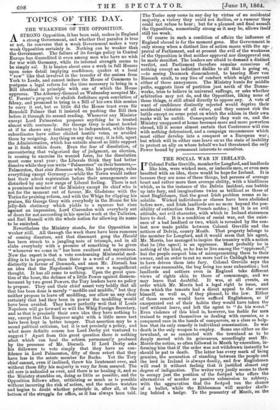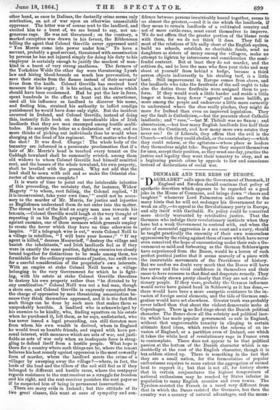THE SOCIAL WAR IN IRELAND. I F Colonel Fulke Greville, memberfor
Longford, and landlords like him, were wicked men, or imbecile men, or even men besotted with an idea, there would be hope for Ireland. It is because they are none of these things, but persons of average heart and rather more than average ability, with a kindliness which, as in the instance of the Delvin incident, can bubble up into fury, and imaginations twice as brilliant as those of most Englishmen, that the great Irish problem seems so in- soluble. Wicked individuals or classes have been abolished before now, and Irish landlords are no more beyond the pos- sibility of extinction than French nobles ; but it is an evil attitude, not evil character, with which in Ireland statesmeu have to deal. It is a condition of social war, not the exist- ence of a bad landlord or two, which is revealed by the con- test now made public between Colonel Greville and the cottiers of Delvin, county Meath. That property belongs to the member for Longford, and it would seem that his agent, Mr. Morris, has managed to inspire the tenantry with a notion that he (the agent) is an oppressor. Most probably he is nothing of the kind, as he has to live among the "oppressed;" but the people suspect him of misrepresenting them to their owner, and an order to cut no more turf in Caddagh bog seems to have driven them into fury. Colonel Greville says the order was reasonable, the bog being too near exhaustion ; but landlords and cottiers even in. England take different views of rights akin to those of commonage, and we may leave that doubtful. It was, at all events, an order which Mr. Morris had a legal right to issue, and from which the tenants had a direct appeal to the owner himself, as well as, if they pleased, to the law. Either of those resorts would have sufficed Englishmen, or if exasperated out of their habits they would have taken the turf without leave, and left the agent to "do his worst." Even violence of this kind is, however, too feeble for men trained to regard themselves as dealing with enemies, as a conquered race in the hands of conquerors, as a class so help- less that its only remedy is individual assassination. In war death is the only weapon to employ. Some one either on the townland, or so connected with the townland as to be deeply moved with its grievances, accordingly sent Mr. Morris the notice, so often followed in Meath by execution, in- forming him that if the order was not withdrawn instantly he should be put to death. The letter has every mark of being genuine, the accusation of standing between the people and the lord in Ireland is always deadly, and few Englishmen will read it without feeling that it justified almost any degree of indignation. The writer very justly seems to them to occupy just the position of the footpad who offers the alternatives of murder or passive submission to robbery, with the aggravation that the footpad ran the chance of a bullet, while the Ribbonman will murder skulk- ing behind a hedge. To the peasantry of Meath, on the other hand, as once to Italians, the dastardly crime seems only retribution, an act of war upon an otherwise unassailable oppressor. The letter was of course sent to the landlord, and excited him to a burst of, we are bound to say, not un- generous rage. He was not threatened ; on the contrary, a marked exception was drawn in his favour, the Ribbonman telling the agent that Colonel Greville never oppressed until "You Morris came into power under him." To have a servant, probably a good servant, threatened with assassination by persons he has not injured simply for doing his duty to his employer is certainly enough to justify the meekest of man- kind in a burst of very strong anathema. The farmers of the Yorkshire Welds the other day were threatening Lyneh law and hiring blood-hounds on much less provocation, to save their stacks from the flames instead of their servants' lives from the knife. Colonel Greville has received hard measure for his anger; it is his action, not its motive which should have been condemned. Had he put the law in force, spent hundreds in the effort to hunt out the extortioner, used all his influence as landlord to discover his name, and finding him, strained his authority to inflict condign punishment he would have done only right. But the incident occurred in Ireland, and Colonel Greville, instead of doing this, instantly fulls back on the ineradicable idea of Irish landlords that they are men encamped among hostile multi- tudes. He accepts the letter as a declaration of war, and no more thinks of picking out individuals than he would when charging at the head of his regiment. What matter who fired the shot? It was fired. Charge ! The whole body of the tenantry are informed in a passionate proclamation that if a hair of ,Mr. Morris's head is touched every tenant on the Caddagh townland shall be summarily evicted, among them old widows to whom Colonel Greville had himself remitted rent, and the houses of the whole townland, his own property, shall be levelled with the ground. Why not add that the land shall be sown with salt and so make the Oriental cha- racter of the utterance complete ?
It is waste of time to point out the intolerable injustice of this proceeding, the certainty that, for instance, Widow Hagerty "to whom, rent failing, the Colonel replied, If it is inconvenient, take your own time,'" could not be acces- sory to the murder of Mr. Morris, for justice and injustice as Englishmen understand them do not enter into the matter. The threat is not of the kind an angry man uses towards his tenants,—Colonel Greville would laugh at the very thought of repeating it on his English property,—it is an act of war against enemies, one of those menaces which generals employ to create the terror which they have no time otherwise to inspire. "If a telegraph wire is cut," wrote Colonel Neill to a village in rebellion, "I will burn your houses ;" "If my agent is killed," decrees lefoui.avieff, "destroy the village and banish the inhabitants," and Irish landlords feel as if they were in exactly the same position, fighting enemies too closely bound together for distinctions to be made among them, too formidable for the ordinary operations of justice, too swift even for a careful consideration of the proprietor's own interests. With an empire at stake Colonel Neill burns a village belonging to the very Government for which he is fight- ing, with his estate at stake Colonel Greville threatens to destroy his own property rather than "be dictated to by any combination." Colonel Neill was not a bad man, though a stern one, and Colonel Greville is expressly exempted from the charge of oppression by men threatening assassination be- cause they think themselves oppressed, and it is the fact that such things can be done by such men that makes them so unspeakably horrible. A landlord who is acknowledged by his enemies to be kindly, who, finding squatters on his estate when he purchased it, left them, as he says, undisturbed, who has never issued a legal proceeding, can still threaten men from whom his own wealth is derived, whom in England be would treat as humble friends, and regard with keen per- sonal interest, with measures which are acts of war, and justi- fiable as acts of war only when an inadequate force is strug- gling to defend itself from a hostile people. What hope is there for a country where such things can be, where the tenant believes his best remedy against oppression is the most cowardly form of murder, where the landlord meets the crime of a villager by sweeping away the village ?—where, in fact, the lords of the land and the tillers of the soil still feel as if they belonged to different and hostile races, where the rentpayer regards resistance to the rent receiver as a struggle for freedom and his right, and the rent-receiver punishes the rent payer as if he suspected him of being in permanent insurrection.
There are many evils in Ireland ; but this attitude of its two great classes, this want at once of sympathy and con- fidence between persons inextricably bound together, seems to us almost the greatest,—and it is one which the landlords, if they mean to remain landlords of a cultivated country and not of mere cattle-runs, must exert themselves to improve. We do not affirm that the greater portion of the blame rests with them, for we do not think it does. They fall in most of the relations of life sadly short of the English squires, build no schools, establish no charitable funds, send no daughters as sisters of mercy among the villagers, make no attempt to lighten by intercourse and consideration the semi- feudal contract. But at least they do not murder, and the cottiers do, and to love the man who fires your ricks and may shoot at yourself from behind a hedge, because a third person objects indiscreetly to his stealing turf, is a little hard. Still improvement in Europe comes from above, and the landlords who take the firstfruits of the soil ought to take also the duties those firstfruits were assigned them to per- form. If they would work a little harder and reside a little longer at home, keep fewer "agents" and more bailiffs, go more among the people and endeavour a little more earnestly to understand where the shoe really pinches, they might do more for Ireland than even an improved legislation. They say the fault is Catholicism,—but the peasants shoot Catholic landlords; and " race,"—b,ut M. Thibalt was no Saxon ; and absenteeism,—but how many English landlords live half their lives on the Continent, and how many more own estates they never see ? Or if Liberals they affirm that the evil is the Church—which they could abolish, or the constabulary—which they could reform, or the agitators—whose place as leaders they themselves might take. Suppose they suspect themselves for once, accept their position, as they must one day, practice the justice and legality they want their tenantry to obey, and as a beginning punish crime by appeals to law and conscience instead of declarations of social war.































 Previous page
Previous page